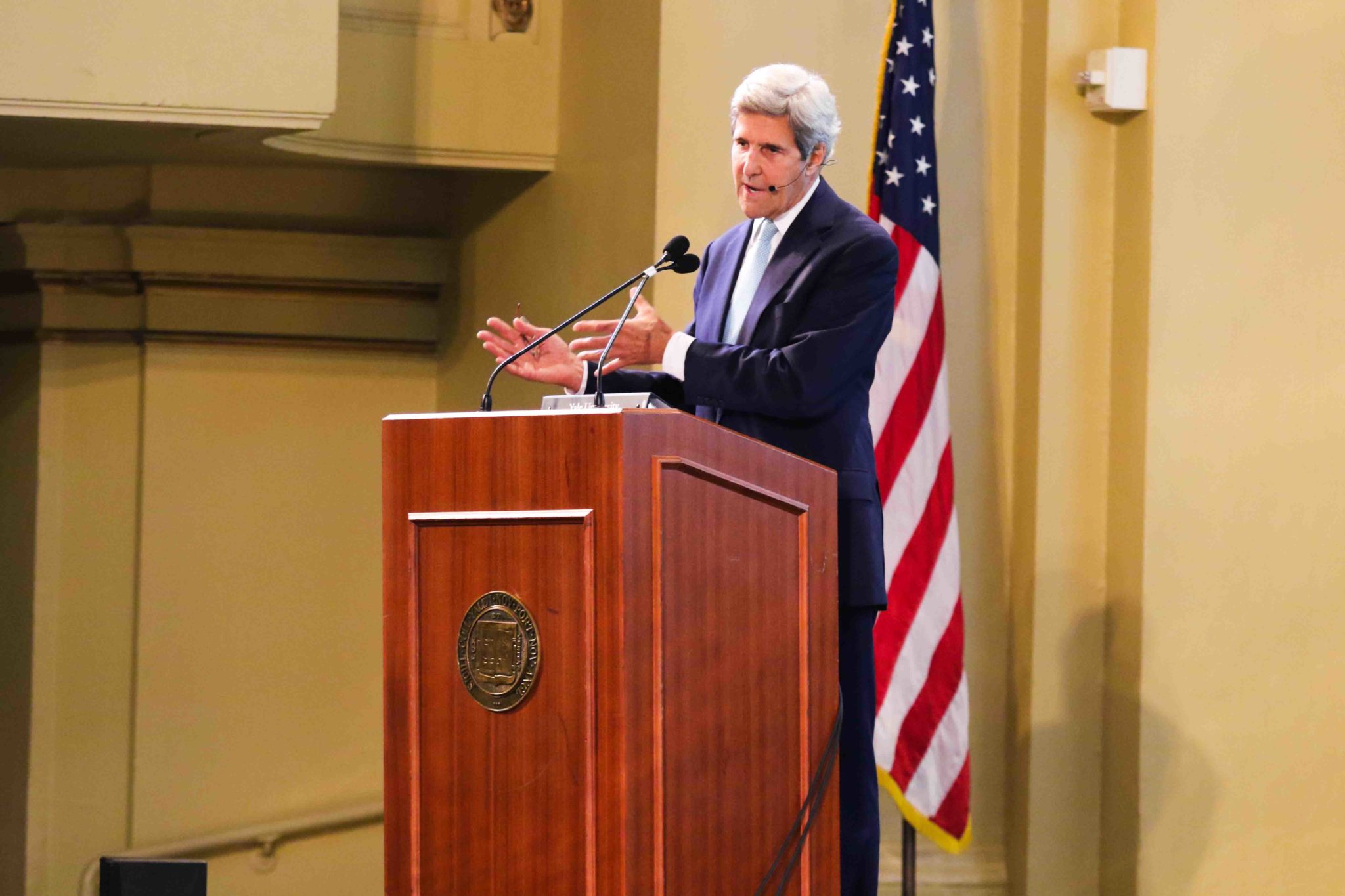
Before coming to Yale, Zack Devlin-Foltz GRD ’18 was an active-duty infantry officer in the Marine Corps. For four and a half years, he was deployed in different corners of the world, from islands in the Pacific to the coasts of the Middle East. Now at Yale, Devlin-Foltz studies state conflict through a much broader lens, working under the guidance of former Secretary of State John Kerry ’66.
Devlin-Foltz is one of 17 graduate and undergraduate students in the Kerry Fellows Program, which is one component of the Kerry Initiative — an interdisciplinary program founded this year and aimed at tackling pressing global challenges through teaching, research and international dialogue.
“We help the secretary in not only just the organizational aspects, but also in providing direction and flavor to his ideas,” said Riddhima Yadav ’18, an undergraduate Kerry Fellow.
Fellows work in small groups that each focus on a specific issue, such as climate change, failing states, extremism, globalization or the future of the workforce. Kerry and his staff developed a list of urgent issues at the beginning of the year, and the fellows were then split into teams and assigned projects last week, according to Kerry Fellow Vaman Muppala SOM ’18.
In addition to leading the Kerry Fellows Program, Kerry is also teaching an application-only seminar focusing on U.S. foreign policy in the 21st century, holding conferences — like last week’s Climate Conference — and organizing “Kerry Conversations” with speakers from various interdisciplinary fields. The first of these talks is expected to take place in October, according to the director of the Jackson Institute, Jim Levinsohn.
Fellows have met with Kerry roughly once a week to discuss future projects and learn about his vision for the program, Yadav said. Muppala said he noticed that Kerry thoughtfully explained the rationale behind each of his ideas and had a “story behind everything.” He said he found this a refreshing difference from his time in the Marine Corps, where the “macroforces behind everything in the military” sometimes went unexplained.
Devlin-Foltz said he was drawn to the interdisciplinary aspect of the Kerry Initiative and has been impressed with his colleagues in the program.
“Anytime I see an opportunity to get together with a group of people who are similarly motivated on these kinds of issues with real-world implications, that’s exciting,” he said. “I’m just sort of honored to be among them.”
Other students echoed Devlin-Foltz’s sentiments, emphasizing the diverse backgrounds of the Kerry fellows, who hail from across the University’s graduate schools, the Yale Jackson Institute for Global Affairs and Yale College. Three of the fellows — Devlin-Foltz, Andrew Dylag SOM ’18 and Muppala — served in the military before coming to Yale.
While most Kerry fellow groups are still finalizing ideas for projects, the team focusing on climate change was closely involved in planning the Yale Climate Conference last week, according to graduate fellow Elle Brunsdale FES ’18. Brunsdale said the group helped write questions for panelists, draft Kerry’s opening remarks, escort speakers and plan other logistics for the event. Now, the fellows are working on a post-conference report focusing on major takeaways from the five sessions, which included talks with prominent climate and energy experts.
Muppala said the team focusing on the workforce is examining how growing trends of automation will affect the future of the labor market. He hopes the group’s work will help policymakers better communicate with people who feel sidelined due to the workforce’s shift away from factory jobs. Muppala is also a member of the globalization group, which he said will examine the past effects of globalization from a nonpartisan perspective with the aim of “making globalization work in the future.”
Devlin-Foltz said that while his group — which focuses on failing states — is in the process of refining its goals, it will broadly focus on the implications that the collapse of a state government would have on security, human rights and the international community. The group is also interested in examining how failed states affect the development of extremist ideologies, Devlin-Foltz added.
Kerry famously did not receive a single “A” during his time at Yale.
Alice Park | alice.park@yale.edu







